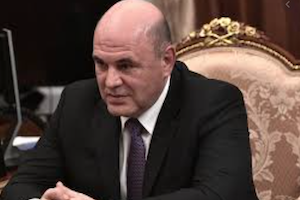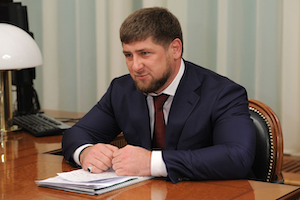Kadyrov in the Shadow of Prigozhin’s Death
By Alexander Yeo and Dr. Emil A. Souleimanov
October 26, 2023
The demise of Yevgeny Prigozhin, the head of the Wagner Group, in August marks a time of change for the Russian elite. Chechnya’s strongman Ramzan Kadyrov is one of the members of the elite most likely to take advantage of the situation to strengthen his own position. In contrast to Prigozhin’s unpredictability, Kadyrov represents a controllable alternative for Putin given his utter reliance on the Russian President, and thus will be able to provide loyalty and stability through his own private security apparatus. The utilization of this apparatus, however, presents risks for Kadyrov. Therefore, Kadyrov is likely to look to improve his internal political position within Russia in the coming months.

Chechnya's Kadyrov Clashes with Russian PM Mishustin
By Emil A. Souleimanov and Huseyn Aliyev
June 10, 2020, the CACI Analyst
At an April 6 ministerial meeting, Russia’s newly appointed Prime Minister Mikhail Mishustin made a remark to the governors of Russia’s provinces, who in the preceding weeks introduced a ban on leaving and entering their respective regions in order to curb covid-19 infections, advising them “not to confuse regional powers with federal authorities.” As Chechnya’s strongman Ramzan Kadyrov had introduced a ban on the republic’s physical contacts with the outside world in the end of March, Kadyrov took this general statement personally. Soon, Kadyrov expressed concern that the prime minister was being “misled.” The conflict marks what some believe is the beginning of a troublesome relationship between Chechnya’s leader and Russia’s newly appointed prime minister.

Kadyrov Continues to Target Enemies Abroad
By Emil A. Souleimanov and Huseyn Aliyev
February 25, 2020, the CACI Analyst
In August 2019, Zelimkhan Khangoshvili, a 41-year old Georgia-born ethnic-Chechen former insurgent and a supposed enemy of Chechen strongman Ramzan Kadyrov, was killed in Berlin. The assassination has raised renewed concerns about the involvement of Russian security services and Chechen loyalists in the systematic liquidation of political opponents and former insurgents outside Russia’s borders. While the involvement of Russian security services in assassinating “traitors” has become a widely-accepted fact following the 2018 Salisbury poisoning of a former Russian spy and his daughter, less is known about the persecution of dissidents or critics of Kadyrov’s regime outside Chechnya and Russia.

Chechnya's Kadyrov Expands Territorial and Political Influence
By Emil A. Souleimanov and Huseyn Aliyev
August 28, 2019, the CACI Analyst
Following Ramzan Kadyrov’s reappointment in 2016 as head of the Chechen Republic for yet another five-year term, the ambitions of the Chechen strongman have grown. While intensifying his age-old rivalry with Rosneft for control over Chechnya’s oil resources and with Gazprom over writing off Chechnya’s debt, Kadyrov has sought to expand to the neighboring republics not only politically but also geographically, claiming parts of Ingush and Dagestani territories. Kadyrov’s ongoing struggle with Ingush activists, along with his interference in the neighboring republic’s internal affairs, has caused an internal revolt in Ingushetia. Likewise, Kadyrov’s claims on contested border territory have stirred tension in Dagestan.

Will Kadyrov be Dismissed? Assessing the Truth Behind the Rumors
By Emil A. Souleimanov and Huseyn Aliyev
July 15, 2019, the CACI Analyst
Reports have recently resurfaced that unspecified federal authorities in Russia plan to oust Ramzan Kadyrov, Chechnya’s infamous strongman and head since 2007, and remove him from public office in Chechnya. While similar rumors have circulated previously, interesting details have made their way into the media, adding to the seriousness of recent speculations. This article attempts to shed light on the prospects of Kadyrov’s ouster as it has been discussed recently, in relation to the more general question of Kadyrov’s ability to maintain power in the years to come.



